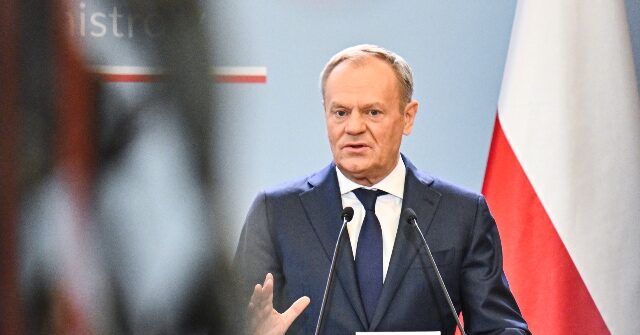Poland’s Prime Minister Donald Tusk announced a significant policy shift regarding asylum claims during a convention in Warsaw, stating that the country would enact a temporary ban on such requests to restore control and ensure national safety. Tusk emphasized the importance of the state regaining “100 percent control over who comes and enters Poland.” This move is part of a broader strategy that he plans to unveil next week, which includes the proposal for a “temporary territorial suspension of the right to asylum.” This decision marks a stark departure from Tusk’s previous pro-European Union stance, given his past role as President of the European Council from 2014 to 2019, and is expected to place him in opposition to the EU, particularly regarding issues tied to migration and sovereignty.
Tusk’s new approach signals a willingness to diverge from EU initiatives, notably the recently pushed asylum reforms designed to redistribute migrants across member states. The reevaluation of Poland’s position comes in a climate where nations like Poland and Hungary have opposed punitive measures associated with the EU’s approach to migration, asserting that they have invested heavily in border security and should not bear the financial penalties for perceived shortcomings of other EU countries. Poland plans to radically minimize illegal immigration and eradicate practices that compromise national security. Tusk highlighted the need to protect Polish citizens, particularly women, from the perceived threats posed by uncontrolled migration.
The Prime Minister elaborated on the external influences affecting Poland’s immigration policies, particularly pointing to Russia and Belarus. He accused the latter of using illegal migrants as tools of “hybrid warfare” against the EU, which has heightened tensions and demand for robust border controls. This perspective gained traction following a stabbing incident involving a soldier at the Polish-Belarusian border, which led to Tusk announcing a security buffer zone. The events of 2021, during which clashes erupted along the border as migrants attempted to enter Poland under false pretenses, underline the urgency Tusk feels regarding border security and the protection of national sovereignty.
Tusk’s administration has a dual approach: while seeking to limit illegal migration, he clarified that this does not equate to a blanket vilification of all migrants. The Prime Minister acknowledged the contributions of those who seek to enter Poland for legitimate reasons—such as studying, working, or integrating into society—and presented a clear distinction between those migrants and those exploiting the asylum process for nefarious purposes. This indicates a nuanced view that recognizes the potential benefits of managed migration while remaining vigilant against security threats, especially in an era where European nations face concerns about terrorism linked to large-scale immigration.
The policy development also reflects a wider trend within the EU, as countries like Austria, France, Germany, and Norway adopt stricter border controls. This shift is driven by complex challenges, including the rise in Islamist terrorism and the socio-political fallout associated with mass migration. The European Union’s struggle to form a cohesive and effective migration policy continues to manifest in national initiatives that prioritize domestic security and citizen safety, an evolving narrative that Tusk’s government seems poised to align with fully.
As Tusk prepares to lay out comprehensive plans next week, the landscape of European immigration policy may undergo further transformation, potentially leading to greater divergence between national governance approaches and EU expectations. The implications of Poland’s stance on asylum could reverberate through diplomatic relations within the EU and influence other member states grappling with similar concerns. Tusk’s push for control over migration reflects broader sentiments in Poland and surrounding nations, which underscores the urgent need for a balance between humanitarian obligations and national security imperatives.

